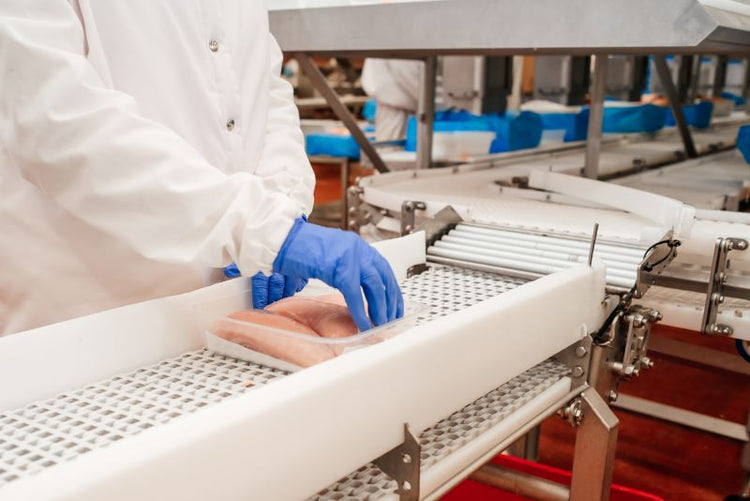Knives are indispensable tools in food processing plants, but they’re not without their challenges. Common issues like dullness, corrosion, improper maintenance, and safety concerns can disrupt operations, compromise food quality, and increase costs. Addressing these problems proactively can help your plant maintain efficiency and safety while extending the life of your food processing knives. This blog explores these challenges and provides practical solutions to ensure your knives perform at their best.
1. Knife Dullness
The Problem:
Blade dullness is one of the most frequent issues in food processing. Dull knives increase the effort required to cut, leading to slower operations, reduced yield, and a higher risk of workplace injuries.
The Solution:
-
Regular Sharpening: Establish a routine sharpening schedule to maintain cutting performance.
-
Invest in Sharpening Tools: Use professional-grade sharpening tools like the Tru-Hone® Sharpener or the Friedr Dick® Sharpener.
-
Monitor Usage: Rotate knives to prevent excessive wear on a single blade.
2. Knife Rust & Corrosion
The Problem:
Food processing knives are constantly exposed to moisture, acidic ingredients, and cleaning agents, making them vulnerable to rust and corrosion.
The Solution:
-
Choose Corrosion-Resistant Materials: Opt for knives made from stainless steel or other corrosion-resistant alloys.
-
Proper Cleaning Practices: Wash knives immediately after use and dry them thoroughly to prevent moisture buildup.
-
Protective Coatings: Consider blades with anti-corrosion coatings for added durability.
3. Improper Knife Maintenance
The Problem:
Poor maintenance practices can be developed by food processing plants over time and they can lead to reduced knife lifespan, inefficient cutting, and safety hazards.
The Solution:
-
Proper Storage: Store knives in designated racks or sheaths to prevent damage to the blade and ensure safety.
-
Regular Inspections: Check knives for signs of wear, damage, or misalignment and address issues promptly.
-
Training Staff: Educate team members on proper knife handling and maintenance techniques.
4. Knife Safety Concerns
The Problem:
Improper knife usage and maintenance–often the result of inadequate training–can result in workplace injuries, including cuts and repetitive strain injuries.
Another common knife safety concern is knives continuing to be sharpened and used once they are past their usage life. Knives sharpened too thin become a hazard, either from pokes when the point becomes small enough to pass through chain gloves, or the thin blades snapping.
The Solution:
-
Ergonomic Designs: Use knives with ergonomic handles to reduce strain during repetitive tasks.
-
Safety Training: Provide comprehensive training on proper knife handling and cutting techniques. At Wolff Industries, we provide skills and safety training to set your team up for success.
-
Protective Equipment: Equip staff with cut-resistant gloves and other safety gear.
5. Premature Knife Wear and Tear
The Problem:
Food processors often have many different cutting tasks in their facility and some tasks may require a specific type of knife. Using the wrong knife for a specific task can lead to premature dulling, chipping, or other forms of damage.
The Solution:
-
Task-Specific Knives: Select knives designed for specific applications, such as breaking, skinning, or boning.
-
Quality Over Quantity: Invest in high-quality knives that offer better durability and performance.
Consult Experts: Work with suppliers like Wolff Industries to identify the best tools for your needs.

Preventative Maintenance Best Practices
To prevent these common issues:
-
Implement a Regular Maintenance Schedule
-
-
Daily cleaning and inspection
-
Weekly edge testing
-
Monthly deep cleaning
-
Quarterly handle inspection
-
Annual replacement assessment
-
-
Proper Storage Solutions
-
-
Use magnetic holders or knife rolls
-
Implement shadow boards for tracking
-
Maintain dry storage conditions
-
Separate knives by purpose
-
Regular storage area cleaning
-
-
Staff Training Programs
-
-
Proper handling techniques
-
Cleaning procedures
-
Safety protocols
-
Maintenance responsibilities
-
Quality control standards
-
The Wolff Industries Difference
At Wolff Industries, we've spent decades helping food processing facilities overcome these common knife challenges. Our comprehensive approach includes:
-
High-quality knives designed for specific processing applications
-
Expert consultation on knife selection and usage
-
Professional sharpeners and sharpener training
-
Customized maintenance programs
-
Safety training and support
-
Regular audits and optimization recommendations
We understand that every facility faces unique challenges, which is why we offer solutions tailored to your specific needs. Our experts can help you select the right knives, implement proper maintenance procedures, and establish best practices that maximize efficiency while minimizing common problems.
The Benefits of Investing in Quality Knives
By addressing common knife issues with the right tools and practices, food processing plants can:
-
Improve operational efficiency
-
Enhance workplace safety
-
Extend the lifespan of their knives
-
Reduce long-term costs
Partner with the Experts
Don’t let problems with your commercial food processing knives slow down your operations. Trust Wolff Industries to provide the high-quality knives and expert support your plant needs to stay productive and safe. With our durable products and customer-first approach, we’re here to help you achieve long-term success.


